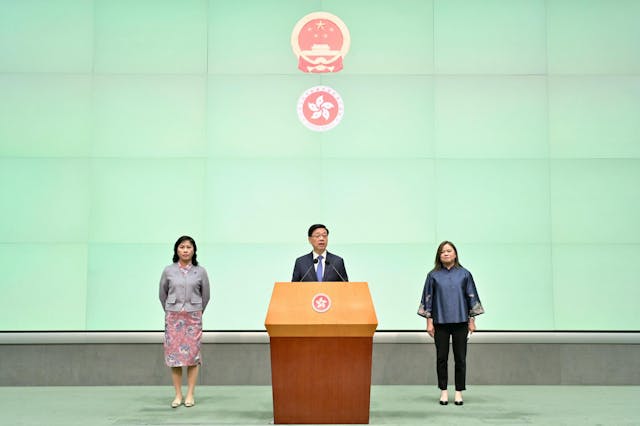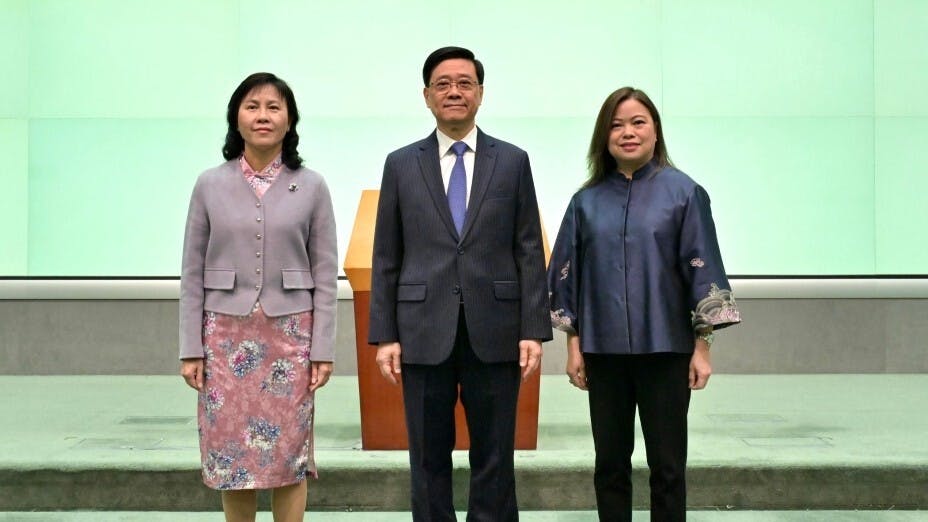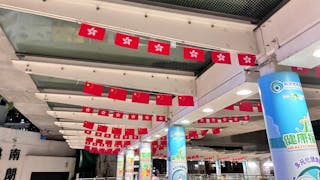新華社於12月5日引述國務院公布,任命陳美寶為運輸及物流局局長、羅淑佩為文化體育及旅遊局局長,接替被免職的林世雄和楊潤雄。
新華社的報道有一點值得注意,是國務院決定免去林、楊的職務,以及對陳、羅的任命,是根據香港《基本法》作出,該法賦予特首李家超向中央作出提名和免職建議的權力。
雖然香港特區問責官員因表現受質疑而被免職的情況並不常見,但李家超政府今次將表現不佳的兩位局長解職,仍值得外界關注。
據香港媒體報道稱,行政長官李家超迴避回應林和楊為何被免職的問題。但李說,更換官員是經過一段時間觀察,並判斷他未來要做的工作,要有什麼團隊,可以創造更大效益及最有效施政。
楊潤雄因未能有效應對多項大型事件而受到輿輪批評,特別是2024年2月國際邁阿密足球俱樂部訪港期間,知名球星美斯沒有在與香港隊的對賽落場。他也因延緩香港藝術和創意產業發展藍圖而受到抨擊。此外,當港人大量北上消費,而內地訪港遊客從以往購買奢侈品變得更加務實和節儉,楊的旅遊政策未能應對這些消費習慣的變化,也遭到輿論質疑。
同樣,林世雄也因未能妥善監管香港的網約車服務,以及某些出租車司機的不當行為而受到批評。楊潤雄也因受到遊客抱怨當局未能解決啟德郵輪碼頭至市中心的交通接駁而受到詬病。

《基本法》賦予特首主要官員任免權
從中央對港管治的角度來說,免去林和楊的局長職務具有憲法和政治意義。首先,《基本法》第48條第5項規定,主要官員由特首提名並報請中央政府任命,並可建議中央政府罷免。因此,李家超提出同時罷免兩名局長的建議,不僅符合《基本法》規定,而且在香港特區的政治史上或許也是史無前例的,因為過去很少有主要官員被「罷免」。
回顧董建華第一屆特區政府中,三位局長因不同原因辭職:葉劉淑儀於2003年6月因23條立法推進受阻,最後赴美留學而請辭;財政司長梁錦松於2003年3月辭職,原因是民眾批評他在車稅改革前購買汽車的失誤;楊永強於2004 年7月辭職,因為公眾批評他在沙士危機期間對公共衛生管理不善。
曾蔭權執政期間,三位司局長因不同原因辭職:商務及經濟發展局局長馬時亨因健康原因於2008年7月辭職,其繼任者劉吳惠蘭後來也於2011年因健康原因辭職,財政司司長唐英年為參選下任特首而請辭。
在李家超政府之前,前任通常會以不同的理由允許司局長辭職,特別是在董建華和曾蔭權時代。罷免確實有過的主要官員,直到梁振英時代才出現,曾德成和鄧國威一起被罷免。林鄭月娥罷免主要官員,顯然是為了改組內閣,這是當時媒體也看到的正常人事做法。局長失誤導致被解職最突出的例子可能是徐英偉。
林和楊被解職的原因普遍被認為是他們的表現不佳。有傳言說李家超在今年初已有意罷免兩位局長,但北京中央政府要求他再等一段時間。

港澳辦或協助觀察問責官員表現
如果觀察沒錯的話,那麼京港關係中一種新的憲制做法已經出現:行政長官可以推薦或提議罷免任何主要官員,然後港澳辦主任夏寶龍觀察有關問責官員的表現,然後中央作出最後決定。
從夏主任這幾個月的言論來看,他確實對香港的旅遊政策進行了含蓄的批評。例如,他於2024年5月在北京會見楊潤雄後提到,香港應該把每個地區都打造成旅遊目的地,並學習其他地方的經驗。夏也評價楊「積極努力,工作值得肯定」。
文化、體育、旅遊以及交通和物流的組合比以往任何時候都更具戰略重要,特別是三中全會報告中,有關香港部分強調了香港在發展成航空中心、航運中心和金融中心的關鍵角色。因此,運輸和物流部長的地位變得比以前更具政治和戰略意義。同樣,如果藝術、文化、創意產業、體育和旅遊業的發展能夠並且增強香港特作為航空和航運中心的地位,那麼這兩個部門對於香港實現一帶一路目標至關重要。
事實上,陳美寶作為新任運輸及物流局局長,很快就要處理重要的基建項目,包括東涌線延線、屯門南延線、北環線等,這些項目都將帶來跨境交通網絡以及香港與大灣區更快的社會經濟和物流整合。同樣,羅淑佩還要應付啟德體育園的進一步發展和2025年的全運會。
總而言之,作為一位渴望展現自己的領導、施政和行政能力的行政長官,李家超向中央當局提出罷免林和楊的建議具有重要的憲法和政治意義。現在問責制下官員自行履行職責已成為憲法慣例。
假如提升施政能力是李家超的競選綱領,同時也是北京對港政策的優先事項之一,那麼現在問責官員不僅要對特首負責,還要對中央政府負責。
OPINION – The constitutional implications of ministerial removal in Hong Kong
The sudden ministerial removal of the former Secretary for Culture, Sports and Tourism Kevin Yeung and the former Secretary for Transport and Logistics Lam Sai-hung in the Hong Kong Special Administrative Region (HKSAR) has important constitutional and political implications.
The report of removing the two ministers, Yeung and Lam, was first announced by Xinhua on December 5 at 10 am, saying that the two would be replaced by Rosanna Law, the former director of housing, and by Mable Chan, the former permanent secretary for the Bureau of Transport and Logistics, respectively.
The brief Xinhua report in Chinese had a noteworthy point: the decision of the State Council to remove Yeung and Lam and to appoint Lam and Chan respectively was made in accordance with the Basic Law of the HKSAR, which stipulates that Chief Executive John Lee can make nominations and suggestions to the central government.
The Hong Kong media reported that Chief Executive John Lee evaded questions on why Yeung and Lam were removed. But Lee said he had observed the secretaries’ performance for some time, and he took stock of what he planned to do. Lee added: “I want a team and secretaries who will be able to deliver what I have in mind. I want to create the best result in the shortest period of Hong Kong because we have lost time during Covid and because of the 2019 riots and black violence.”
John Lee also emphasised that a bureau secretary must demonstrate leadership by proactively addressing the issues, tackling challenges, uniting the teams of officials, and facilitating effective dialogue.
Kevin Yeung had been criticised by the mass media for his failure to deal with mega events effectively, notably the visit of the Inter Miami football club to Hong Kong in February 2024 when its famous star Lionel Messi did not play in the match against the Hong Kong team. He was also criticised for delaying a blueprint for Hong Kong’s development of the arts and creative industries. Yeung’s tourism policy was also a target of public criticisms, especially when there was a surge of Hong Kong visitors going to spend a huge amount of money in Shenzhen and the Greater Bay Area (GBA), but the mainland tourists’ spending habits changed from buying luxurious goods to spending more pragmatically and frugally in Hong Kong.
Similarly, Lam Sai-hung was criticised for failing to regulate the ride-hailing services, notably Uber, and to control the misconduct and malpractices of some taxi drivers in the HKSAR. Lam was also under criticism for failing to deal with the lack of public transport in the Kai Tak Cruise Terminal, where tourists complained about the poor transportation networks linking the terminal to the city centre.
However, Lam’s performance appeared to be better than Yeung’s. Lam at least dealt with the toll adjustment for three road harbour crossings, but his record was tarnished by the delays in rolling out the HKeToll electronic toll collection system and the traffic chaos at the airport during the attack of typhoons and the related computer breakdown. Furthermore, insufficient transport preparatory work led to the displeasure of many mainland tourists who were stranded in Sheung Shui and who were forced to stay in Hong Kong for a night when they came to the territory for the New Year’s Eve countdown fireworks.
From a critical perspective, while Lam appeared to fail to demonstrate his crisis consciousness and preparedness, Yeung’s problematic performance in dealing with the Inter Miami’s visit to Hong Kong and in propelling the development of the arts and creative industries showed that his expertise in sports, arts and culture was weak. Before he was redeployed to cope with culture, sports and tourism, Yeung was a secretary pushing forward education reform in the Carrie Lam administration. Since his education reforms were necessary after the implementation of the national security law, they were formulated in a top-down manner and implemented in a much smoother way.
While it was uncommon to witness the removal of ministers in the HKSAR leadership due to their questionable performance, such removal of secretaries in the John Lee administration has been prominently due to underperformance.
Although the mass media have been quite critical of Yeung and Lam’s performance, both were dedicated officials trying their very best to serve the Hong Kong community.
There are constitutional and political implications for the removal of Yeung and Lam from their secretary positions.
First, Article 48 (5) of the Basis Law stipulates that the Chief Executive nominates and reports to the central government for the appointment of principal officials, and that he or she recommends to the central government their removal. As such, John Lee’s recommendations of removing two ministers simultaneously were not only in line with the Basic Law but also perhaps unprecedented in the political history of the HKSAR, for very few principal officials were in the past “dismissed,” borrowing a blunt word from the Chinese media, for their “failure” to perform.
Second, the removal of Yeung and Lam could be seen as the first time the HKSAR Chief Executive recommended their removal because of prominent failure in their performance, albeit John Lee did not explain the reasons for such removal. In the first Tung Chee-hwa administration, three ministers resigned for different reasons: Regina Ip resigned in June 2003 for her personal reason to study in the United States amid the difficulties of pushing forward the national security bill; Financial Secretary Antony Leung resigned in March 2003 due to public criticism of his misstep in buying a car prior to the change of vehicle tax; and Yeoh Eng-kiong resigned in July 2004 amid public criticisms of his “mismanagement” of public health during the crisis of the Severe Acute Respiratory Syndrome (SARS).
During the Donald Tsang administration, three ministers resigned for varied reasons: commerce secretary Frederick Ma resigned in July 2008 due to health grounds, his successor Rita Lau also later resigned in 2011 on health reasons, and Financial Secretary Henry Tang resigned due to his decision to run in the Chief Executive elections.
During the C. Y. Leung administration, three ministers resigned due to varying reasons: development secretary Mak Chai-kwong resigned in July 2012 because he was accused of being involved in a controversy over “housing subsidies.” civil service secretary Paul Tang was removed from office in July 2015 due to an “unexpected family issue,” and home affairs secretary Tsang Tak-sing was removed from office in July 2015 amid the rumours that his work on youth was regarded as “inadequate.” Chief Executive C. Y. Leung exercised his constitutional power under the Basic Law to recommend to Beijing the removal of two ministers. Judging from media reports at that time, one of the two ministers seemed to have questionable performance.
In the Carrie Lam administration, six ministers were removed from office due to different reasons. In 2020, civil service secretary Joshua Law Chi-kong, home affairs secretary Lau Kong-wah, financial services and treasury secretary James Henry Lau Yee Cheung, and innovation and technology secretary Nicholas Yang were recommended by Chief Executive Carrie Lam to the central government for removal, but the apparent reason was a personnel reshuffle. Furthermore, in 2021, Chief Secretary Matthew Cheung was removed and replaced by John Lee. In January 2022, home affairs secretary Casper Tsui resigned for taking his responsibility of attending a party in which some people were infected with Covid-19.
Analytically speaking, before the John Lee administration, his predecessors usually allowed ministers to resign on different grounds, especially during the Tung Chee-hwa and Donald Tsang era. The removal of ministers did happen, but it was not common until the C. Y. Leung era in which Tsang Tak-sing was removed together with Paul Tang. Carrie Lam removed her ministers in an apparent move to reshuffle the secretaries – a normal personnel practice that was also seen by the media at that time. The most prominent case of a minister making mistake that led to removal was perhaps Casper Tsui.
The reason of the most recent removal of Yeung and Lam has been commonly seen as their underperforming standard. There was a rumour saying that John Lee wanted to remove the two ministers in early 2024, but the central government in Beijing asked him to wait for a while (see: https://www.hk01.com/, December 5, 2024).
If the enhancement of governing capacity was the campaign platform of John Lee and if it remains one of the priorities of Beijing’s policy toward Hong Kong, principal officials are now held individually and collectively accountable to not only the Chief Executive but also the central authorities in Beijing.
Third, regardless of whether the rumour above was accurate, it must be noted that the director of the Hong Kong Macau Affairs Office, Xia Baolong, met Lam Sai-hung in February 2024 when he visited the HKSAR for an inspection study. Xia also met Lam in Beijing in April 2024 when Lam reported the progress in maritime, aviation, and logistics developments (see: news.gov.hk – Transport chief ends Beijing trip). Xia also met Kevin Yeung in Beijing when Yeung reported on the progress of his bureau’s work. It appeared that the HKMAO director was observing the performance of the two ministers after the rumour that Chief Executive John Lee toyed with the idea of removing them in early 2024. With the benefit of hindsight, the HKMAO director appeared to take a closer look at the work of Yeung and Lam before the central authorities formally and finally approved the recommendations from the Chief Executive.
Fourth, if the above observation is accurate, then a new constitutional practice in Beijing-HKSAR relations has been emerging: the Chief Executive may recommend or propose removal of any minister, and then the HKMAO director observes the performance of the minister concerned, after which the central authorities make a final decision.
Fifth, judging from the remarks made by Xia Baolong in the past several months, he did make implicit criticisms of the Hong Kong policy on tourism. For instance, he mentioned in May 2024, after meeting Yeung in Beijing, that Hong Kong should make every district a tourist destination and that it should learn from the experiences of other places. Xia also commented on Yeung as “actively working hard and his work deserves affirmation.” No matter whether Xia’s remarks on Yeung were positive or not, he appeared to establish a constitutional practice of meeting different secretaries in the HKSAR, partly because of the need to listen to their work, and partly due to the necessity of holding them accountable to the central government in Beijing under the broader umbrella of exercising the centre’s “comprehensive jurisdiction” over the HKSAR.
Sixth, the removal of Yeung and Lam has important constitutional and political implications for the Hong Kong Principal Officials Accountability System (POAS) in the coming years. The POAS was set up by the Tung Chee-hwa government in July 2002 to provide a batch of dedicated and appointed officials who are expected and required to fully support the Chief Executive in policy formulation and implementation. Twenty-two years after its establishment, the POAS can be seen as entering a new stage under which the national security law promulgated in mid-2020 has emphasised not just the importance of national security in the HKSAR, but also the “positive intervention” from the central authorities in enhancing the governing capacity of Hong Kong. As such, the HKMAO director’s inspection visit to Hong Kong and his meeting with Hong Kong ministers in Beijing mean that the POAS is also holding the accountability of Hong Kong secretaries to the central government. The accountability of principal officials to both the Chief Executive and the central government has obviously been enhanced and elevated to a new level of constitutional importance.
The removal of Yeung and Lam has important constitutional and political implications for the Hong Kong Principal Officials Accountability System (POAS) in the coming years
Seventh, the portfolios of culture, sports, and tourism and of transport and logistics have become more strategically important than ever before, especially since the Third Plenum report in which its section on Hong Kong emphasised the HKSAR’s role in building up its aviation center, financial and monetary center, and maritime center. As such, the position of the Secretary of Transport and Logistics, who must tackle both aviation and maritime development, is becoming more politically and strategically significant than before. Similarly, if the development of arts, culture, creative industries, sports and tourism can and will enhance the HKSAR’s role as an aviation center and maritime center, then the former positions of Yeung and Lam are critical for Hong Kong’s achievement of the objectives of the Third Plenum.
In fact, Mable Chan as the new Secretary of Transport and Logistics will have to deal with important infrastructure projects soon, including the Tung Chung Line Extension, Tuen Mun South Extension, and the Northern Link – all projects that will lead to cross-boundary transportation networks and Hong Kong’s much faster socio-economic and logistical integration with the GBA. Similarly, Rossana Law will have to deal with the further development of the Kai Tak Sports Park and the National Games in 2025. Sensing the urgency of the two secretarial portfolios, it is understandable that John Lee decided to replace Kevin Yeung and Lam Sai-hung with Rosanna Law and Mable Chan as soon as possible.
In conclusion, while it was uncommon to witness the removal of ministers in the HKSAR leadership due to their questionable performance, such removal of secretaries in the John Lee administration has been prominently due to underperformance. As a strong Chief Executive keen to demonstrate his leadership, governing capacity and administrative competence, John Lee’s recommendations to the central authorities to remove Yeung and Lam had important constitutional and political implications. It is now a constitutional practice for the ministers under the POAS to perform themselves. If not, they can be recommended by the Chief Executive to Beijing for removal – a process that triggers the closer observations from the HKMAO director who meets with the ministers concerned. The POAS is entering a new phase in which all the appointed secretaries must perform well, demonstrate their leadership, provide convincing explanations to the members of the public, and show their proactive approach to working with the Chief Executive as an effective batch of principal officials. If the enhancement of governing capacity was the campaign platform of John Lee and if it remains one of the priorities of Beijing’s policy toward Hong Kong, principal officials are now held individually and collectively accountable to not only the Chief Executive but also the central authorities in Beijing.
原刊於澳門新聞通訊社(MNA)網站,本社獲作者授權轉載。(原文按此)




































